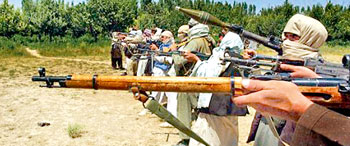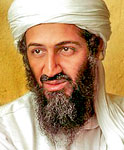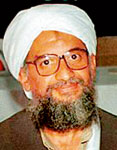The belief that elements of Pakistan's intelligence service knew where terror chief Osama Bin Laden was hiding has long been a source of contention with the U.S.
But now it appears that belief could be true after a mobile phone recovered from the raid last month was found to contain contacts from a militant group tied with Pakistan's intelligence agency.
 |
| Militants: The mobile phone contained the numbers of Harakat-ul-Mujahedeen commanders, who would have had close contact with Al Qaeda operatives in Waziristan (file picture) |
The discovery indicates that Bin Laden used the group, Harakat-ul-Mujahedeen, as part of his support network within the country.
U.S. officials say it also raises questions over whether the Al Qaeda chief was being sheltered by elements within the spy agency.
Analysts tracing calls made on the phone have found that Harakat commanders called Pakistani intelligence officials and that the agency had mentored the group and allowed it to operate within the country for 20 years.
It is not known if the calls were to discuss Bin Laden and there is no proof that Pakistan's intelligence agency protected the terror chief.
The revelations, made by the New York Times, shed some light on how Bin Laden was able to live comfortably for years in Abbottabad, a town dominated by the Pakistani military and just 35 miles from the capital Islamabad.
It may also help to explain how he was able to escape from U.S. forces in the Tora Bora region of Afghanistan nearly 10 years ago.
Harakat has strong roots in the area around Abbottabad, where Bin Laden was tracked down and killed by a U.S. Navy Seals team on May 2.
Its leaders also have strong ties with both Al Qaeda and the Inter-Services Intelligence agency.
Senior American officials did not identify the commanders whose numbers appeared the mobile phone - owned by Bin Laden's trusted courier.
But they were from South Waziristan, where Al Qaeda and other groups have been based for years.
Harakat's network would have allowed Bin Laden to pass on messages and money to Al Qaeda members there and in other parts of Pakistan's tribal areas, the analysts said.
 |
 |
| Links: Analysis of a mobile phone seized during the raid on Osama Bin Laden's compound last month has revealed contact with a militant organisation that had ties to Pakistan intelligence |
Bin Laden
communicated only with his most senior commanders,
including his deputy, Ayman al-Zawahri |
Bin Laden and his courier, Ibrahim Saeed Ahmed, were discovered by U.S. intelligence through a chance interception of an Ahmed call.
That set in motion the secret CIA search of the area around Abbottabad, ending in the raid last month which killed the terror chief, Ahmed's brother Abrar and two other people.
Bruce O. Riedel, a former CIA officer and author of 'Deadly Embrace: Pakistan, America and the Future of Global Jihad' said Harakat was very close to Al Qaeda.
He told the New York Times: 'The question of ISI and Pakistani Army complicity in Bin Laden's hide-out now hangs like a dark cloud over the entire relationship between Pakistan and the U.S.'
Suspicions have also been raised that elements of the spy agency may have sought to hide Bin Laden to ensure billions of dollars of military aid continued to flow from the U.S. to Pakistan while he was still alive.
© Daily Mail, London
Bin Laden planned to change the name al Qaeda because of image problem
As Osama bin Laden watched his terrorist organisation get picked apart, he lamented in his final writings that al Qaeda was getting a bad reputation and so needed a name change.
His group was killing too many Muslims and the West was winning the public relations fight.
Faced with this challenge, Bin Laden, who hated the United States and decried capitalism, considered a very American business strategy.
Like Blackwater, ValuJet and Philip Morris, al Qaeda would start afresh under a new name.
The problem with the name al Qaeda, bin Laden wrote in a letter recovered from his compound in Pakistan, was that it lacked a religious element, something to convince Muslims worldwide that they are in a holy war with America.
Maybe something like Taifat al-Tawhed Wal-Jihad, meaning Monotheism and Jihad Group, would do the trick, he wrote.
Or Jama'at I'Adat al-Khilafat al-Rashida, meaning Restoration of the Caliphate Group.
As bin Laden saw it, the problem was that the group's full name, al Qaeda al-Jihad, for The Base of Holy War, had become short-handed as simply al Qaeda.
Lopping off the word 'jihad,' bin Laden wrote, allowed the West to 'claim deceptively that they are not at war with Islam.'
Maybe it was time for al Qaeda to bring back its original name.
The letter, which was undated, was discovered among bin Laden's recent writings.
Navy Seals stormed his compound and killed him before any name change could be made.
The letter was described by senior administration, national security and other U.S. officials only on condition of anonymity because the materials are sensitive.
The documents portray bin Laden as a terrorist chief executive, struggling to sell holy war for a company in crisis.
At the White House, the documents were taken as positive reinforcement for President Barack Obama's effort to eliminate religiously charged words from the government's language of terrorism.
Words like 'jihad,' which also has a peaceful religious meaning, are out. 'Islamic radical' has been nixed in favour of 'terrorist' and 'mass murderer.'
Though former members of President George W. Bush's administration have backed that effort, it also has drawn ridicule from critics who said the president was being too politically correct.
'The information that we recovered from bin Laden's compound shows al Qaeda under enormous strain,' Obama said on Wednesday in his speech to the nation on withdrawing troops from Afghanistan.
'Bin Laden expressed concern that al Qaeda had been unable to effectively replace senior terrorists that had been killed and that al Qaeda has failed in its effort to portray America as a nation at war with Islam, thereby draining more widespread support.'
Bin Laden wrote his musings about renaming al Qaeda as a letter but, as with many of his writings, the recipient was not identified.
Intelligence officials have determined that bin Laden only communicated with his most senior commanders, including his deputy, Ayman al-Zawahri, and his No. 3, Mustafa Abu al-Yazid, according to one U.S. official.
Because of the courier system bin Laden used, it's unclear to U.S. intelligence whether the letter ever was sent.
Al-Yazid was killed in a U.S. air strike last year. Zawahri has replaced bin Laden as head of al Qaeda.
In one letter sent to Zawahri within the past year or so, bin Laden said al Qaeda's image was suffering because of attacks that have killed Muslims, particularly in Iraq, officials said.
In other journal entries and letters, they said, bin Laden wrote that he was frustrated that many of his trusted longtime comrades, whom he'd fought alongside in Afghanistan, had been killed or captured.
Using his courier system, bin Laden could still exercise some operational control over al Qaeda.
But increasingly the men he was directing were younger and inexperienced.
Frequently, the generals who had vouched for these young fighters were dead or in prison.
And bin Laden, unable to leave his walled compound and with no phone or Internet access, was annoyed that he did not know so many people in his own organisation.
The U.S. has essentially completed the review of documents taken from bin Laden's compound, officials said, though intelligence analysts will continue to mine the data for a long time.
© Daily Mail, London |




